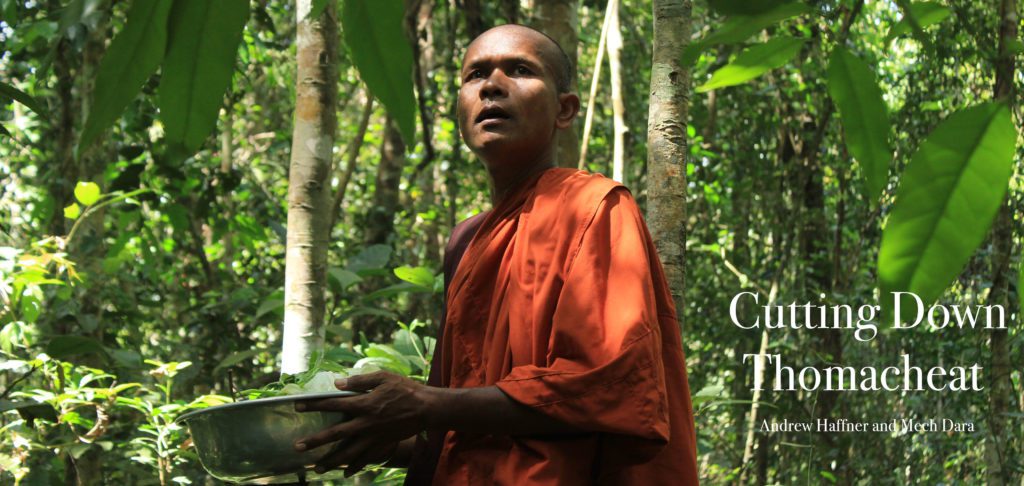
In Kampong Speu, a forest-dwelling monk hoots to mimic animals’ cries and talks of living in harmony with nature. But the community forest where he lives has been handed to the military, and nearby residents are camping among the trees to protect the land.
From his simple pagoda in the forest just outside Phnom Oral Wildlife Sanctuary, the Venerable Prom Thomacheat doesn’t see much worth leaving for in the outside world.
Thomacheat, a Buddhist monk, lives in the woods just outside the rural Po Meas village in Oral district of Kampong Speu. His sparsely arranged pagoda is an open-air shelter made up of a large concrete slab covered by a blue metal roof.
Years before, he had been an official co-founder of the banished environmental activist group Mother Nature. Today, his activism is limited to defending the forest he calls home from an officially sanctioned transfer to military families, a giveaway that has sparked a bitter conflict in a commune where locals say major agribusiness groups have already carved up the landscape.
“There is no point in living since [authorities and the government] continue their harassment with all kinds of means,” Thomacheat lamented to reporters on a night in early February. The surrounding woods were alive with the sound of insects and other animals as the monk spoke. “Everything we do to protect [the forest] is illegal but when they come to clear — it is not illegal.”
The woods, known in varying locations as the Metta forest or Udom Sre Kphos community forest, are shared by Thomacheat — which is the word for nature in Khmer — and a local forest community, whose members forage for wild foods and other natural goods. Villagers also allow their cattle to graze openly through the unfenced area.
Thomacheat’s stretch of the forest is a tranquil place, and instructive to the religious outlook the monk shares with the many Cambodian tourists who visit his temple as part of guided tours of nearby Phnom Oral, the country’s tallest peak. But as Buddhism teaches a lack of attachment to worldly things, the disappearing forest is proving instructive for that as well.
That’s because last year, a royal sub-decree granted 262 hectares of forest land here to the military’s armored vehicle military unit, officially to be given over for clearance and settlement by military families. The rights group Licadho notes the land is part of the Phnom Oral Wildlife Sanctuary and has traditionally been used by about 253 families.
Local residents say that last year’s decree, dated August 20, took away and privatized a vital community asset without any notice. In the months after, villagers told VOD, uniformed members of the elite Brigade 70 infantry unit have made their presence felt throughout the forest, clearing out parts of the woods and marking trees for removal near Thomacheat’s pagoda. Their attempts to claim the land granted to them by decree have led to clashes with villagers that on February 22 involved soldiers reportedly assaulting and firing warning shots at a group that had interfered with their work. Before that, six residents of Po Meas have been summoned repeatedly for questioning with provincial police stemming from an October protest.
By February, villagers had since about January 19 taken to sleeping in the woods to keep watch, as well as patrolling during the day to confront soldiers and their hired hands as they tried to cut down trees. Though the sub-decree granted land to the armored vehicle unit, villagers say it is really Brigade 70, which was once tasked with guarding Prime Minister Hun Sen, that is claiming the area.
In early February at the villagers’ forest camp, about five people gathered on a late afternoon to organize for the evening. Trucks heading to and from a neighboring sand quarry rumbled along a dirt road bordering the woods, all lying within close reach of the nature preserve around Phnom Oral, Cambodia’s tallest mountain.
The villagers at the simple camp said they would stand their ground to protect the trees.
“We’re not afraid of anything,” said Lim Sim, 75. “What happens is for the next generation to see. If we don’t try there will be nothing left for them.”
She and the others explained that they pool contributions of food and other supplies to last through the nights. Members of the forest community also patrol the forest during the day, which takes as long as three hours by foot. They estimated the size of the forested area to be more than 800 hectares, but said that includes parts now being used for agriculture.
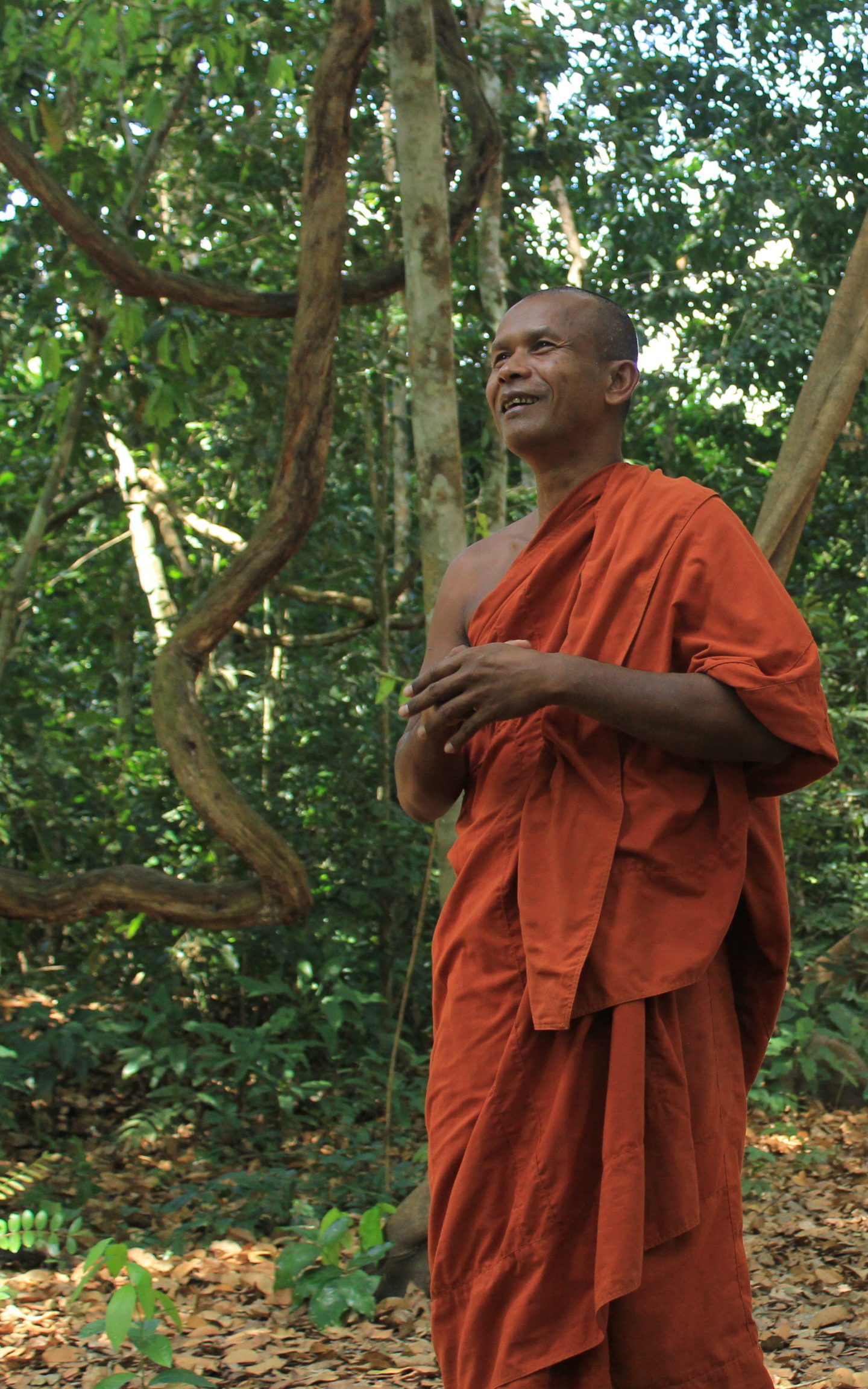
Prom Thomacheat speaking in front of what he says is the largest tree in the Metta Forest around his pagoda in Trapeang Chour commune. The monk lives a hermit-like existence near the Oral Wildlife Sanctuary in Kampong Speu. (Andrew Haffner/VOD)
Prom Thomacheat carrying food for a resident gibbon in the Metta Forest around his pagoda in Trapeang Chour commune, near the Oral Wildlife Sanctuary in Kampong Speu. (Andrew Haffner/VOD)
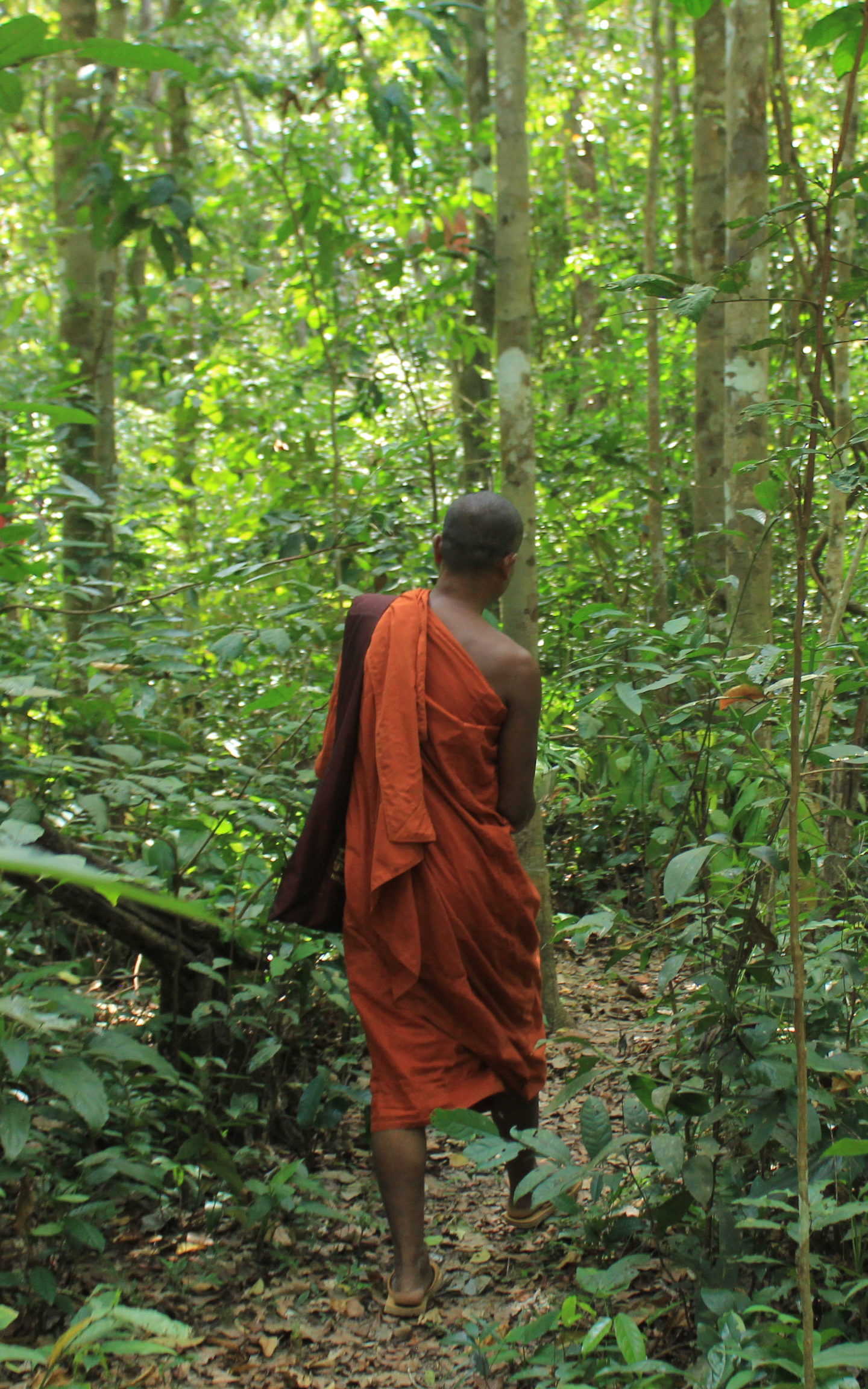
Fellow camp protester Soy Sath said they had no intention of leaving, even as it appeared that different officials were now working together to assert control of the woods.
“There’s too much injustice, and I think if we do not find the truth, it will continue to happen,” said Sath. “We are prepared to die to protect the forest.”
The situation is obscured even more by opaque village-level politics, with those now camped in the forest accusing their deputy village chief Mon Y of flipping his allegiances to support the military takeover of the forest. In the past, the villagers in the forest say, Mon Y was the head of their group, leading the way to getting official status for the area to become a community forest as recognized by the Ministry of Environment. But when he became the deputy village chief in 2020, that process inexplicably ground to a sudden halt.
The dissenting villagers say the ministry’s approval was all but confirmed, to the point where the community had officially received heavy concrete posts, each about as tall as a man, to demarcate the bounds of the protected community forest. Those posts now lie piled in the dirt outside the Po Meas home of Mon Y, who reporters met eating an early dinner in the late afternoon with local environmental officials at a small station less than 100 meters from the villagers’ forest camp.
The officials did not comment directly on the situation in the surrounding woods, though one told journalists they should report their presence in the area to local authorities.
Mon Y said he could not comment, as his working hours were over for the day, but said reporters should be professional and attempt to get all sides of the story. However, he also fumed that a villager had brought reporters near his house to see the demarcation posts without permission.
“You are lucky that my house does not yet have a gate, because if we had one, we would shut it tightly and make my dog bite you all over,” he said, adding that reporters should not say that the forest dispute happened after he’d become the deputy village chief.
Mon Y provided a phone number to reporters and told them to call at a later date. He didn’t pick up when called.
Since the sub-decree went into effect, the military’s claim to the land has flared into multiple clashes with the forest community members. Just last week, villagers said they were assaulted by soldiers in the woods after confronting the troops and a group of workers. This has been a repeated pattern in the woods, where a similar incident played out on February 22.
Villagers spoke to VOD and the rights group Licadho after that earlier clash, saying that Brigade 70 soldiers had fired their guns as a warning, but also beat and choked three people. One of the villagers, Phon Thoch, 60, said the men had threatened to fire on them if they did not disperse.
“They [said they] have the law and rights and they will shoot us one by one: ‘One comes, one gets shot; two come, two get shot,’” Thoch told VOD by phone the day after the incident.
The altercation was only the latest in a series of conflicts. On October 23, Brigade 70 members and their hired hands attempted to clear trees within the sub-decree area but were met by villagers who had gathered to stop them. Sok Ly, a resident of Po Meas, said the villagers had seized a bulldozer from its hired driver during those protests.
After the confrontation, police issued summonses for questioning to six of the protesting villagers, including Ly. The six went to meet with provincial police to answer to allegations of vandalism, public intimidation and public insult. Police held the six overnight, which on December 1 prompted a group of more than 600 villagers to gather outside to urge their release, according to media outlet Cambodianess.
The tension and anger near the forest’s edge stands in stark contrast to the tranquility cultivated elsewhere among the trees, where Thomacheat ponders humanity’s place in the natural world. The monk, who is also known by his clergy name of Dhammajat, is known in Cambodia for his hermit-like lifestyle, which he says he’s kept for about 20 years. He relies on support from locals to maintain himself and spends much of his days in the surrounding woods, meditating and tending to the forest. That includes feeding animals there, which he does while hooting and calling to them, mimicking their natural cries.
The villager Ly said the monk has also helped provide some moral standing to the community’s cause.
“[He] gives us spiritual support. He loves the animals and wants to save them, and so he makes people come together,” Ly explained, though he said there were limits to that. “He is one who can gather people and he knows people outside who can support those of us who are sleeping in the forest — but it’s only us who can protect our community. He can only give us support.”
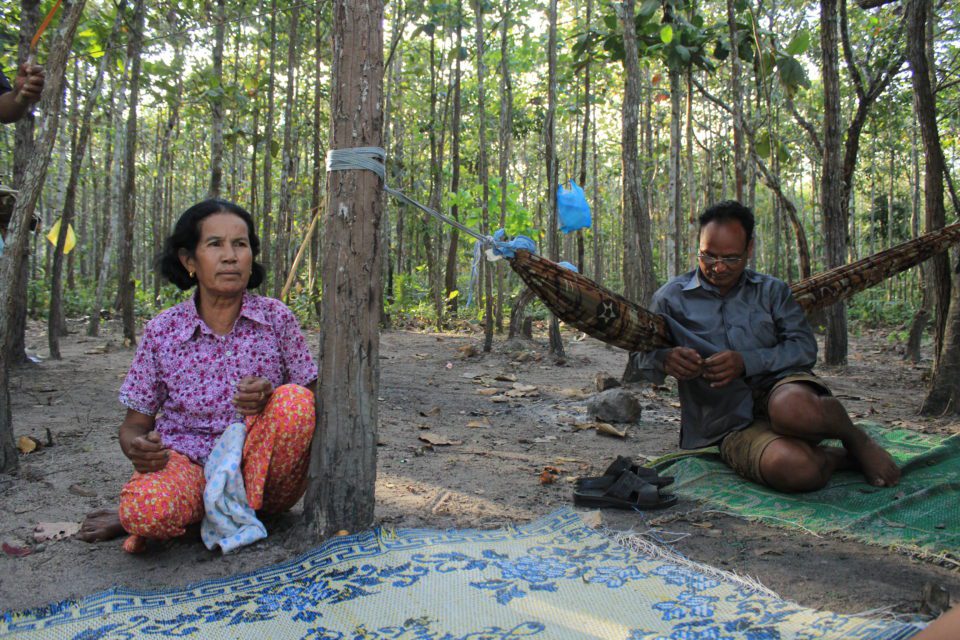
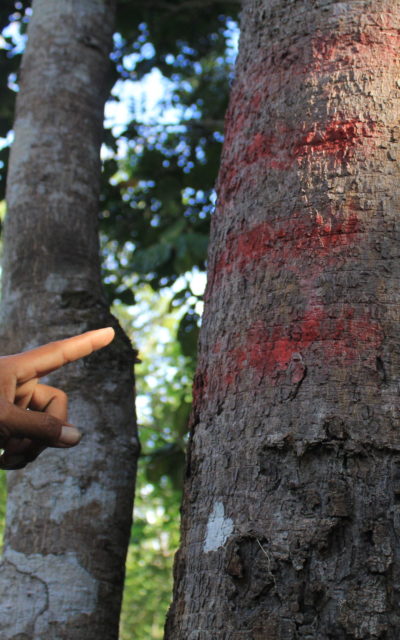
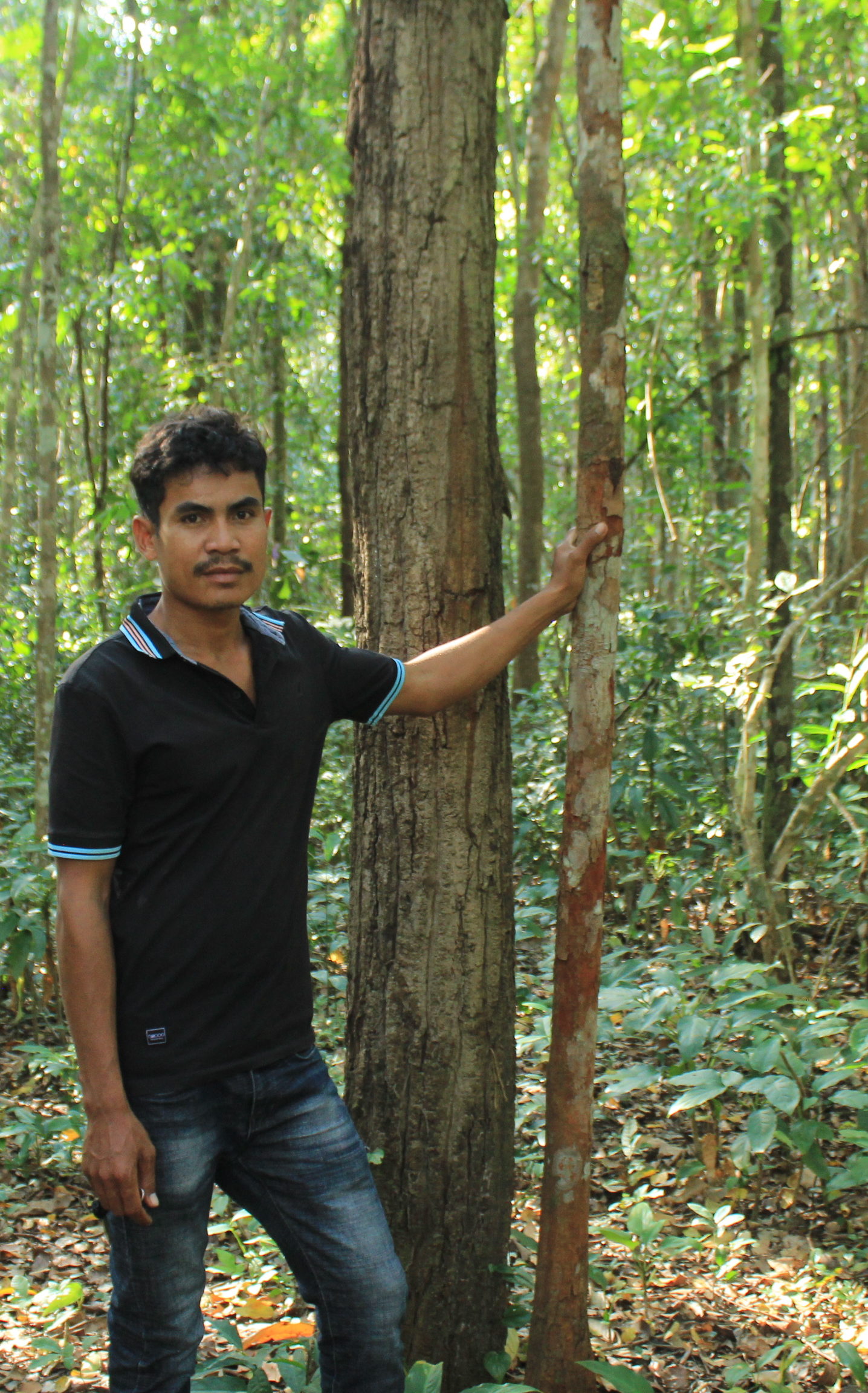
in the Metta Forest. (Andrew Haffner/VOD)
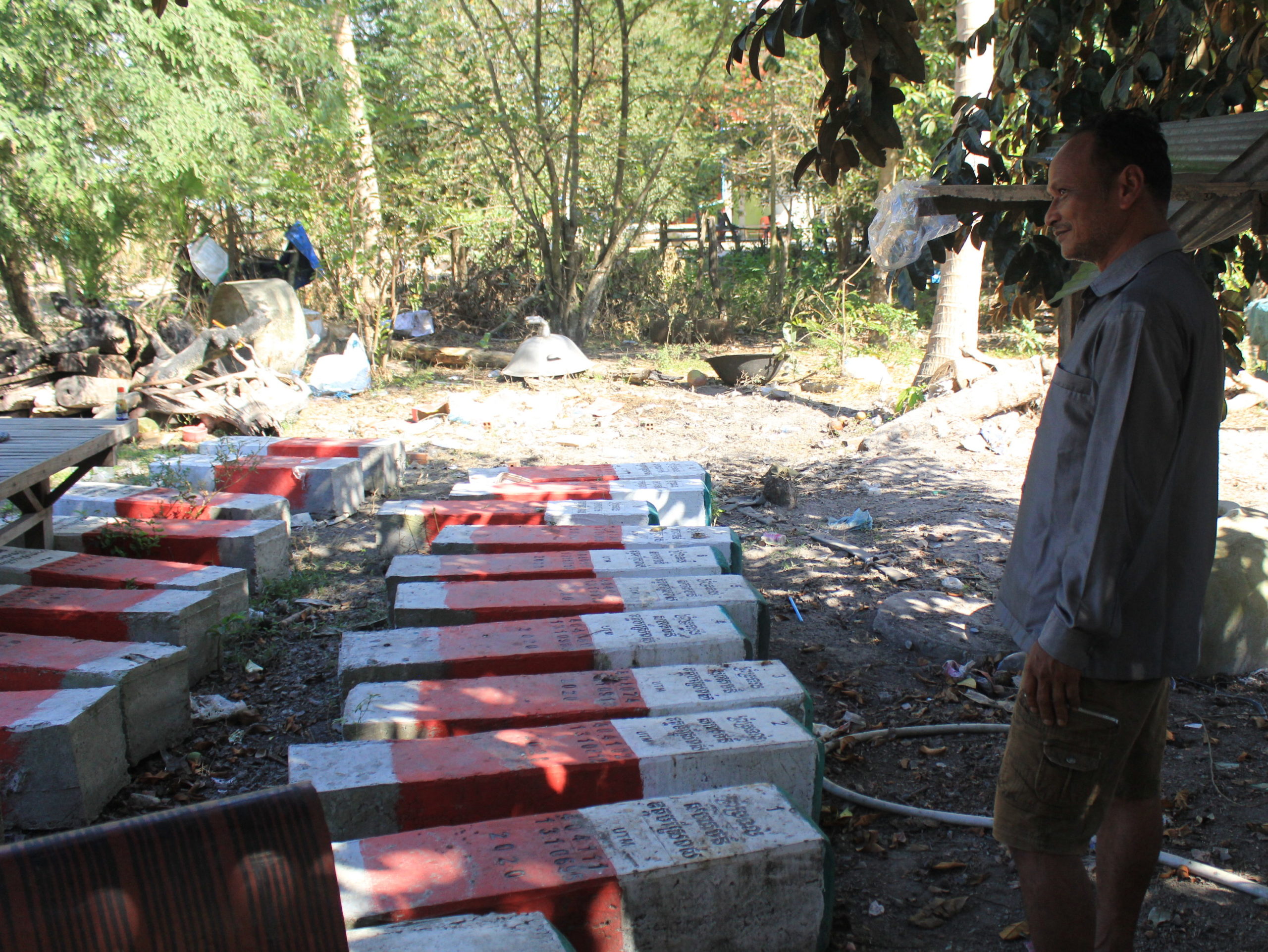
Thomacheat’s teachings are intertwined with reflections on humanity’s place in the natural world, and he says that humans should seek to live in harmony with animals as if they were family. Signage throughout his stretch of the woods urges visitors to treat the forest with respect with slogans such as: “Put down the gun, pick up the Buddha.”
In his basic pagoda, Buddhist statues and icons sit at one end of the space, while various supplies for his living are arranged across the floor in small piles. The monk spoke expansively with reporters, weaving references to faraway figures such as American civil rights icon Martin Luther King Jr. with jokes and lamentations.
“I am a weird human being that cannot live like other people. Even when I came to live in the forest, they still kept coming to cause trouble for me,” Thomacheat said.
The monk’s presence in the woods has been opposed, at various points, both by authorities and locals attempting to cut timber or hunt animals — possibly including a man in 2013 who allegedly fired shots at him and another monk in the little pagoda.
Thomacheat also drew official ire through his association with Mother Nature. He was a founding member, along with fellow monk Sok Chantra and the group’s outspoken leader, Alex Gonzalez-Davidson, who was arrested and deported to Spain in 2015. The group has remained the country’s most prominent environmental activist network even after it was officially deregistered in 2017.
Though Thomacheat’s actual work with Mother Nature was limited for most of its official existence, he played a fateful role in its final days by formally requesting it be dissolved by the Interior Ministry.
The monk said he’d made the request amid escalating harassment from authorities. He and Chantra in 2016 had been charged with a litany of crimes by the Koh Kong Provincial Court as accomplices to three other Mother Nature activists who had been filming sand dredging operations there. Though the court dropped its charges against the monks later that year, Thomacheat said the pressure had continued to grow.
“If we did not close it, they would have come to strangle us until our tongues came out,” he said, adding that forming the group was a “pure-hearted” act.
But even after Mother Nature was officially dissolved, the cultivated peace of the Metta forest remains balanced on a saw’s edge. Much as the neighboring villagers, the monk is steadfast that he will not abandon the forest.
“If they say we do this or that which is illegal, then we cannot do anything,” he said. “I have come to live with the Buddha, and if they want to cut my throat, then they can go ahead and do it in front of the Buddha — please do not bring it to court, I would rather die here in front of the Buddha.”











